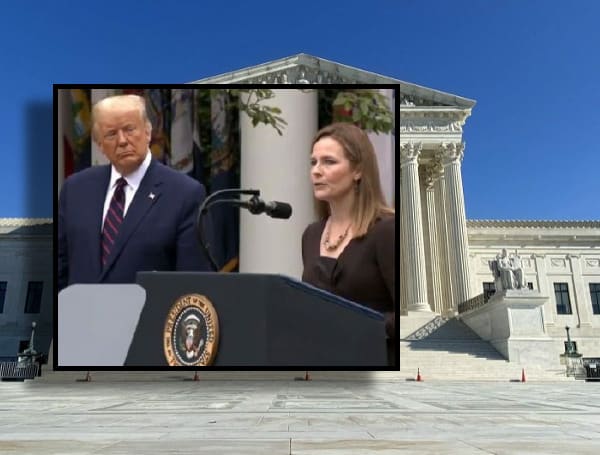Mary Margaret Olohan
- Supreme Court Justice Amy Coney Barrett worried Sunday that the Supreme Court is increasingly being portrayed to the public as a partisan institution, emphasizing that justices must be “hyper vigilant” that they do not let personal biases effect their work.
- “The media, along with hot takes on Twitter, report the results and decisions,” Barrett said, adding that this “makes the decision seem results-oriented” and “leaves the reader to judge whether the court was right or wrong, based on whether she liked the results of the decision.”
- Barrett’s comments come at a contentious political moment in which she herself is facing intense scrutiny over abortion rulings.
Supreme Court Justice Amy Coney Barrett worried Sunday that the court is increasingly being portrayed to the public as a partisan institution, emphasizing that justices must be “hyper vigilant” that they do not let personal biases affect their work.
“My goal today is to convince you that this court is not comprised of a bunch of partisan hacks,” she told guests at the University of Louisville Sunday, the Courier Journal reported. “Judicial philosophies are not the same as political parties,” she said, citing several cases where the Supreme Court did not rule along party lines.
“The media, along with hot takes on Twitter, report the results and decisions,” Barrett continued, adding that this “makes the decision seem results-oriented” and “leaves the reader to judge whether the court was right or wrong, based on whether she liked the results of the decision.”
“And here’s the thing: Sometimes, I don’t like the results of my decisions,” the Supreme Court justice continued, according to the Courier Journal. “But it’s not my job to decide cases based on the outcome I want.”
The justice also emphasized that members of the highest court in the land should be “hyper vigilant to make sure they’re not letting personal biases creep into their decisions, since judges are people, too,” Politico reported.
Barrett’s comments come at a contentious political moment in which she herself faces intense scrutiny over abortion rulings: media and Democrats have predicted that appointing Barrett to the court would result in radical right-wing, Handmaid’s Tale like rulings.
Earlier this month, the Supreme Court denied abortion providers’ requests to block Texas’ new law banning abortions after a baby’s heartbeat can be detected (about six weeks), and the court will soon consider a Mississippi law banning abortions after 15 weeks.
The case, Dobbs vs. Jackson Women’s Health Organization, deals with a 2018 Mississippi law challenged by the Center for Reproductive Rights, the law firm Paul Weiss, Rifkind, Wharton & Garrison, and the Mississippi Center for Justice on behalf of the last remaining abortion clinic in Mississippi — Jackson Women’s Health Organization.
After the Fifth Circuit Court of Appeals struck down the law in December 2019, the state of Mississippi asked the Supreme Court to take up the case.
Dobbs vs. Jackson Women’s Health Organization will touch on the landmark Roe v. Wade ruling since the Supreme Court will hear arguments on whether abortion bans prior to fetal viability are constitutional, signaling that the Court is focused on the constitutionality of legal limits on late-term abortions.
During her confirmation hearings last fall, Democrats, media outlets and activists fixated on Barrett’s adherence to Catholic principles and her large family, suggesting that she was “extreme” and unfit to serve on the Supreme Court.
But rather than making huge splashes in her interpretation of hot button cases as many conservatives have called on her to do, Barrett has thus far chosen to interpret narrowly and to join with Justice Brett Kavanaugh and Chief Justice John Roberts over the more conservative justices.
The new justice joined a 7-2 majority in June rejecting a challenge to the Affordable Care Act, though her critics had warned that Barrett would immediately take aim at Obamacare.
Progressive groups, media and activists alike reacted similarly when Kavanaugh replaced former Supreme Court Justice Anthony Kennedy, arguing that he was the fifth vote needed to overturn Roe v. Wade.
The emotional backlash against Kavanaugh’s confirmation escalated following multiple allegations of sexual assault against the future Supreme Court justice. Accuser Christine Blasey Ford’s lawyer would later admit that putting an “asterisk” next to Kavanaugh’s name before “he takes a scalpel” to Roe v. Wade was “part of what motivated Christine” to accuse him.
But liberal predictions that Kavanaugh would radicalize the court didn’t come to fruition after the it struck down a law that would significantly restrict abortion access: June Medical Services v. Russo, in which an abortion provider challenged a law requiring abortion providers to have admitting privileges to a hospital within 30 miles of the facility.
Chief Justice Roberts sided with the liberal justice in a 5-4 ruling that struck down the Louisiana law. The decision was met with heavy criticism from conservatives, particularly because Roberts also voted with the liberal justices on recent DACA and LGBTQ rulings.
Support journalism by clicking here to our gofundme or sign up for our free newsletter by clicking here
Android Users, Click Here To Download The Free Press App And Never Miss A Story. It’s Free And Coming To Apple Users Soon.
